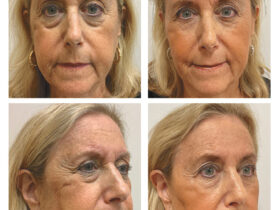By Anna M Avola DMD, MS
 Going to a dentist that focuses on the “baby boomer” generation is not a bad thing! Actually it’s a smart thing to do. In fact, since dental health is connected to the health of the whole body, oral health should be a priority. This is called the oral systemic connection.
Going to a dentist that focuses on the “baby boomer” generation is not a bad thing! Actually it’s a smart thing to do. In fact, since dental health is connected to the health of the whole body, oral health should be a priority. This is called the oral systemic connection.
Good dental hygiene is important to overall health at any age. But as we age, teeth can become more prone to cavities and other oral problems. Therefore, it becomes even more important to take care of your teeth as birthdays come and go. Increased life expectancies have caused a large increase in the aging population. In fact, by the year 2030 nearly 20% of the total U.S. population will be older than 65 years of age. Unlike 50 years ago, people are keeping their teeth as they age. This is the main reason why there is an increased demand for geriatric dentistry.
What is Geriatric Dentistry?
Geriatric dentistry is the delivery of oral care to patients who require diagnosis, management, prevention and treatment of dental problems associated with age-related diseases. According to research, more than half of all dental patients over 60 years of age are on medication or are medically compromised in some way. The U.S. Surgeon General has stated that older Americans suffer from a “silent epidemic” of serious, consequential dental health problems.
9 Reasons Senior Dental Health Care is Important:
There are a number of reasons why men and women over the age of 55 should consider seeing a geriatric dentist. Bacteria in your mouth can cause more health problems than just cavities. There are over 600 different types of bacteria in your mouth! Many of these bacteria are good and aid in digestion, but others have been related to serious health issues. Since oral health directly impacts the health of the whole body, these issues need to be taken seriously.
1. Heart disease has been linked to gingivitis and periodontal disease. Research has shown that maintaining good oral hygiene is a powerful weapon in preventing heart attacks and strokes. The American Academy of Periodontology point out that people with periodontal disease are twice as likely to have coronary artery disease! In fact, one study discovered that the presence of common problems in the mouth, including gum disease (gingivitis), cavities and missing teeth, were good indicators of heart disease.
2. Diabetes is also associated with advanced gum disease, called periodontitis. High blood sugar, which is an effect of diabetes, can increase the chances of gum infections. Good oral care in addition to regular dental checkups can help to control this condition.
3. Pneumonia and poor oral health have been linked as a result of breathing in bacterial droplets from the mouth to the lungs. The chances of contracting pneumonia increases with age. Good oral health care is particularly important in keeping the bacteria in your mouth to a minimum.
4. Cancer treatments such as chemotherapy and radiation can impact the amount of saliva, leaving your mouth, tongue and lips very dry. In addition, your lowered immunity can cause an increase in fungal infections called thrush in your mouth.
5. Dry mouth, xerostomia, is a side effect of over 400 medications. It is known that 30% of patients older than 65 are affected with dry mouth. Saliva keeps the mouth lubricated which protects teeth from decay and prevents infection by controlling bacteria. Lack of saliva can lead to mucositis, caries, cracked lips and fissured tongue.
6. Gum disease, gingivitis, is caused by plaque and food left in our teeth. Moreover, the use of tobacco products, unhealthy diets, poor fitting bridges and dentures, diseases like anemia, cancer and diabetes all contribute to gum inflammation. Unfortunately, gum disease can aggravate tooth loss and can be very serious for overall health as it has been linked to many problems in the body.
7. Root decay can be caused by exposure to acids from food and improper brushing which is very common as a person ages. As the gum recedes, the root of the tooth is exposed. Because the root is not covered with enamel as the crown of the tooth, it will decay more quickly.
8. Darkened teeth occur as we age because the dentin, or the bone-like tissue that underlies the tooth enamel, changes as a result of beverages and food. Staining to the thin outer enamel layer allows the yellow dentin to show through can also create the appearance of darkened teeth.
9. Patients who wear dentures need to have their mouths examined because poor fitting dentures can also contribute to chronic inflammation and sores. This can be a very uncomfortable situation and may be corrected by an experienced geriatric dentist.
Anna M Avola, DMD, MS
Dr. Avola has a general practice focusing on geriatric dentistry. The practice offers comprehensive dental care dedicated to the over 50 crowd! The dental office is designed to accommodate the changing oral health needs due to the normal aging process and the medically compromised patient.
DENTAL SCHOOL:
Tufts University, School of Dental Medicine, Boston, 1978
MASTER OF SCIENCE DEGREE:
Gerontology, Florida Gulf Coast University, 1999
MEMBERSHIPS:
American Dental Association, Florida Dental Association, West Coast District Dental Association, American Academy of General Dentistry, American Academy of Oral Systemic Health
ACADEMIC APPOINTMENTS:
Assistant Professor, Tufts University
Associate Professor, Hodges University









